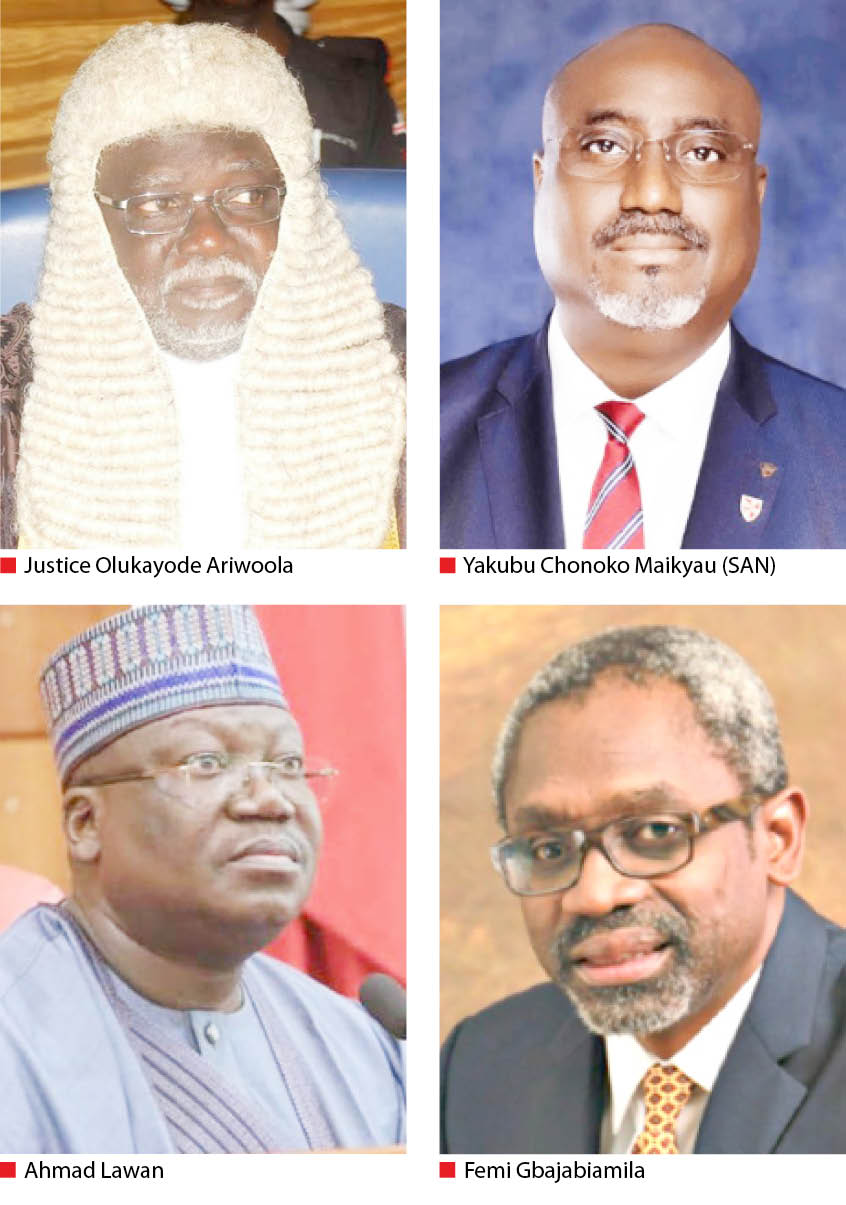As Nigeria prepares for the general elections in 2023, the judiciary as a critical arbiter of electoral disputes still lacks sufficient judicial officers to provide this and its other constitutional obligations.
With the number of justices on the Supreme Court and Court of Appeal benches still well below the constitutional provisions, there are concerns about the impact of the shortage on the imminent 2023 elections disputes.
- Immigration dismisses 8 personnel, sanctions 18 over infractions
- Immigration dismisses 8 personnel, sanctions 18 over infractions
Aside from the current shortfall in the nation’s highest courts, the ratio of judges to litigants in Nigeria, with only 1,179 judges, according to the National Judicial Council (NJC), attending to a population of about 218 million people with hundreds of thousands of cases pending in courts, is of grave concern to justice delivery.
Although the NJC and the Federal Judicial Service Committee (FJSC) have commenced the process for the appointment of six justices for the highest courts, analysts say that with only 13 justices left on the bench of the Supreme Court, this may not address the anticipated challenges in election disputes.
The justices are: Justices Olukayode Ariwoola, Musa Dattijo Muhammad, Kudirat Kekere-Ekun, John Inyang Okoro, Centus Nweze, Amina Augie, Uwani Abba-Aji, Lawal Garba, Helen Ogunwumiju, Ibrahim Saulawa, Adamu Jauro, Tijjani Abubakar and Emmanuel Agim.
At least, two of the justices, Dattijo Muhammad and Augie are billed to retire on October 27, 2023 and September 3, 2023 respectively, leaving the apex court with lesser numbers than provided by the constitution at the time of post-election hearings.
Section 230(1) to (2) of the Constitution of the Federal Republic of Nigeria, 1999, as amended, provides that there shall be a Supreme Court of Nigeria, “which shall consist of (a) the Chief Justice of Nigeria; and b) provides that such number of Justices of the Supreme Court, not exceeding twenty-one, as may be prescribed by an Act of the National Assembly.”
Section 232(1) further provides that “the Supreme Court shall, to the exclusion of any other court, have original jurisdiction in any dispute between the Federation and a state or between states if and in so far as that dispute involves any question (whether of law or fact) on which the existence or extent of a legal right depends.
Sub-section (2) provides that, “in addition to the jurisdiction conferred upon it by subsection (1) of this section, the Supreme Court shall have such original jurisdiction as may be conferred upon it by any Act of the National Assembly, provided that no original jurisdiction shall be conferred upon the Supreme Court with respect to any criminal matter.
“233(1) The Supreme Court shall have jurisdiction, to the exclusion of any other court of law in Nigeria, to hear and determine appeals from the Court of Appeal.”
For the Court of Appeal, Section 237(2)(a) and (b) provides thus: “The Court of Appeal shall consist of – (a) a President of the Court of Appeal; and (b) such number of Justices of the Court of Appeal, not less than forty-nine of which not less than three shall be learned in Islamic personal law, and not less than three shall be learned in Customary law, as may be prescribed by an Act of the National Assembly.”
Section 239(1) provides that “the Court of Appeal shall, to the exclusion of any other court of law in Nigeria, have original jurisdiction to hear and determine any question as to whether – (a) any person has been validly elected to the office of President or Vice-President under this Constitution, or (b) the term of office of the President or Vice-President has ceased, or (c) the office of President or Vice-President has become vacant.”
The FJSC had shortlisted 29 candidates in the ongoing appointment process to fill six vacancies on the Supreme Court bench, who are all of the Court of Appeal.
The implication of this is that while the Court of Appeal presently has about 80 justices, the appointment of six out of the 29 shortlisted justices for elevation, and an additional 16 present and imminent vacancies on the bench due to retirements and appointments, the number of justices would drastically drop.
Although the Court of Appeal has surpassed the 49 minimum number of justices required by the constitution, with 20 divisions across the federation, there are plans by the House of Representatives to increase the number to 110 justices.
Due to the imminent vacancies in the highest courts, the President of the Nigerian Bar Association (NBA), Yakubu Maikyau (SAN) announced the plans to include lawyers in the proposed recruitment exercise for justices of the Court of Appeal.
He stated that the President of the Court of Appeal (PCA), Justice Monica Dongban-Mensem had in a letter dated September 28, 2022, and received on September 30, 2022, requested the association “to recommend suitably qualified persons, for consideration for appointment to the Court of Appeal bench, to fill the present and imminent vacancies.”
The letter stated that the slots available for nomination are two for North-Central, three for North-East, five for North-West, three for South-East, two for South-West, and one for South-South geopolitical zones.
It is uncertain how many lawyers would make the list, as the NBA had also early this year advocated for the inclusion of lawyers on the list for consideration on the Supreme Court bench, with none shortlisted.
The Court of Appeal justices who made the shortlist are Justices Jummai Sankey, Stephen Jonah Adah, Sa’idu Tanko Hussain, Ridwan M. Abdullahi and Mohammed Baba Idris for North-Central; Ali Abubakar Babandi Gumel, Tani Yusuf Hassan, Mohammed Lawal Shuaibu, Justice Jamilu Y. Tukur and Balkisu Bello Aliyu for North-West; Uzoamaka I. Ndukwe-Anyanwu, Chidiebere N. Uwa, Chioma Nwosu-Iheme, Theresa N. Orji-Abadua, Obande F. Ogbuinya, Uchechukwu Onyemenam, Onyekachi A. Otisi, Ugochukwu A. Ogakwu and Kenneth Ikechukwu Amadi, for South-East.
Others are: Justices Moore A. Abraham Adumein, Biobele A. Georgewill, Frederick O. Oho, Abimbola O. Obaseki-Adejumo, Ebiowei Tobi, for South-South; Oyebisi F. Omoleye, Tunde O. Omotoye, Habeeb A. O. Abiru, Peter Olabisi Ige and Joseph Olubunmi Kayode Oyewole, for South-West.
Reacting to the development, Dayo Akinlaja (SAN) said there is an urgent need to appoint more justices of the Supreme Court and Court of Appeal.
“Interestingly enough, the appointment process is not independent of the judiciary itself and described it as one of the “unending paradoxes of the country.”
“In a way, therefore, it is difficult to get why the judiciary should be lamenting about the radical shortfall in its judicial personnel, especially at the apex court,” he said.
Similarly, the director of the Centre for Social Justice (CSJ), Eze Onyekpere, said the easiest solution is to appoint more judges in Nigeria, especially, to increase the constitutional number of justices on the bench of the Supreme Court.
He also recommended the prioritisation of competence and knowledge of law over political influence in the appointment of judges and the automation of the judiciary to prevent the continued use of long-hand by judges.
“If the political will is there, these issues can be turned around overnight,” he said.
Reacting to the issues raised, a senior official of the NJC, who pleaded anonymity, informed Daily Trust Saturday that the council is in the process of appointing new justices to fill up existing vacancies.

 Join Daily Trust WhatsApp Community For Quick Access To News and Happenings Around You.
Join Daily Trust WhatsApp Community For Quick Access To News and Happenings Around You.


